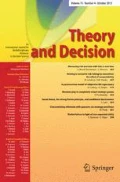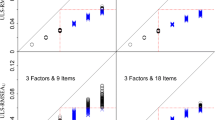Abstract
This article reports an empirical investigation of the cognitive effort required to decide in multiattribute binary choice using a variation of the Additive Difference strategy. In contrast with other studies, this paper focuses on the effect of various context variables (rather than task variables) on cognitive effort. In order to select the context variables to be manipulated, we used the model proposed by Shugan (1980; J. Consumer Res. 75 (1980) 99). Our results indicate that there is a positive relationship between the cognitive effort required to decide and the mean of the differences between the dimensions of the choice alternatives. We have also found an inverse relationship between cognitive effort and the variance of the differences between the dimensions of the choice alternatives. Finally, we have found that in negative correlation contexts the effort needed to decide is greater than in positive and null correlation contexts.
Similar content being viewed by others
References
Alloy, L.B. and Tabachnik, N. (1984), Assessment of covariation by humans and animals: the joint influence of prior expectations and current situational information. Psychological Review 91: 112–149.
Aschenbrenner, K.M., Albert, D. and Schmalhofer, F. (1986), Stochastic choice heuristics. Acta Psychologica 56:153–166.
Beach, L.R. and Mitchell, T.R. (1998), A contingency model for the selection of decision strategies. In L.R. Beach (Ed.). Image Theory: Theoretical and Empirical Foundations. Mahwah, NJ: Lawrence Erlbaum Associates.
Bettman, J.R. and Kakkar, P. (1977). Effects of information presentation format on consumer information acquisition strategies. Journal of Consumer Research 3:233–240.
Bettman, J.R. and Zins, M.A. (1977). Constructive processes in consumer choice. Journal of Consumer Research 4: 75–85.
Bettman, J.R., Johnson, E.J. and Payne, J.W. (1998), Constructive consumer choice processes. Journal of Consumer Research 25: 187–217.
Bettman, J.R., Johnson, E.J. and Payne, J.W. (1990), A componential analysis of cognitive effort in choice. Organizational Behavior and Human Decision Processes 45:111–139.
Bettman, J.R., Johnson, E.J., Luce, M.F. and Payne, J.W. (1993), Correlation, conflict, and choice. Journal of Experimental Psychology: Learning, Memory and Cognition 19:931–951.
Bockenholt, U., Albert, D., Aschenbrenner, M. and Schmalhofer, F. (1991), The effects of attractiveness, dominance, and attribute differences on information ac-quisition in multiattribute binary choice. Organizational Behavior and Human Decision Processes 49:258–281.
Einhorn, H.J. and Hogarth, R.M. (1981), Behavioral decision theory: processes of judgment and choice. Annual Review of Psychology 32: 53–88.
Ford, J.K., Schmitt, N., Schechtman, S.L., Hults, B.M. and Doherty, M.L. (1989), Process tracing methods: contributions, problems, and neglected re-search questions. Organizational Behavior and Human Decision Processes 43: 75–117.
Huber, O. (1980), The influence of some task variables on cognitive operations in an information-processing decision model. Acta Psychologica 45:187–196.
Huber, J. and Klein, N.M. (1991), Adapting cutoffs to the choice environment: the effects of attribute correlation and reliability. Journal of Consumer Research 18: 346–357.
Iglesias-Parro, S., De la Fuente, E.I. and Ortega, A.R. (1999), Descriptive models and strategies on decision making. Boletín de Psicología 64: 7–30.
Iglesias-Parro, S., Ortega, A.R., De la Fuente, E.I. and Martín, I. (2001). Context variables as cognitive effort modulators in decision making using an alternative-based processing strategy. Quality and Quantity, 35,311–323.
Johnson, E.J., Payne, J.W. and Bettman, J.R. (1988), Information displays and preference reversals. Organizational Behavior and Human Decision Process 42: 1–21.
Johnson, E.J., Meyer, R.J. and Ghose, S. (1989), When choice models fail: com-pensatory representations in negatively correlated environments. Journal of Marketing Research 26:255–270.
Johnson, E.J., Payne, J.W., Schkade, D.A. and Bettman, J.R. (1991), Monitor-ing information processing and decisions: the Mouselab system. Unpublished manuscript, Center for Decision Studies, Fuqua School of Business, Duke University.
Lohse, G.L. and Johnson, E.J. (1996), A comparison of two process tracing meth-ods for choice tasks. Organizational Behavior and Human Decision Processes 68: 28–43.
Payne, J.W. (1976), Task complexity and contingent processing in decision mak-ing: an information search and protocol analysis. Organizational Behavior and Human Decision Processes 16:366–387.
Payne, J.W. (1982). Contingent decision behavior. Psychological Bulletin, 92: 382–402.
Payne, J.W., Bettman, J.R. and Johnson, E.J. (1990), The adaptative decision maker: effort and accuracy in choice. In R.M. Hogarth (Ed.), Insights in De-cision Making: A Tribute to Hillel J. Einhorn. Chicago, IL: University of Chicago Press.
Payne, J.W., Bettman, J.R. and Johnson, E.J. (1992), Behavioral decision re-search: A constructive processing perspective. Annual Review of Psychology 43: 87–131.
Payne, J.W., Bettman, J.R. and Johnson, E.J. (1993a), The Adaptative Decision Maker. Cambridge: Cambridge University Press.
Payne, J.W., Bettman, J.R. and Johnson, E.J. (1993b), The use of multiple strategies in judgment and choice. In Castellan, N. (Ed.), Individual and group decision making: Current issues. Hillsdale, NJ: Lawrence Erlbaum Associates.
Payne, J.W., Bettman, J.R. and Luce, M.F. (1996), When time is money: decision behavior under opportunity-cost time pressure. Organizational Behavior and Human Decision Processes 66:131–152.
Payne, J.W., Bettman, J.R. and Luce, M.F. (1998), Behavioral decision research: an overview. In M.H. Birnbaum (Ed.). Measurement, Judgment, and Decision Making. Handbook of Perception and Cognition (2nd ed). San Diego, CA: Academic Press.
Pitz, G.F. and Sachs, N.J. (1984), Judgment and decision: theory and application. Annual Review of Psychology 35:139–163.
Russo, J.E. and Dosher, B.A. (1983), Strategies for multiattribute binary choice. Journal of Experimental Psychology: Learning, Memory and Cognition 9:676–696.
Russo, J.E., Staelin, R., Nolan, C.A., Russell, G.J. and Metcalf, B.L. (1986), Nutrition information in the supermarket. Journal of Consumer Research 13: 48–70.
Schkade, D.A. and Kleinmuntz, D.N. (1994), Information displays and choice processes: differential effects of organization, form, and sequence. Organiza-tional Behavior and Human Decision Processes 57:319–337.
Seggie, I. (1987), The judgement of covariation between binary variables: some conditions that influence the process. Memory and Cognition 15:341–348.
Shugan, S.M. (1980), The cost of thinking. Journal of Consumer Research 75: 99–111.
Stone, D.N. and Schkade, D.A. (1991). Numeric and linguistic information presentation in multiattribute choice. Organizational Behavior and Human Decision Processes 49: 42–59.
Stone, D.N. and Schkade, D.A. (1994). Effects of attribute scales on process and performance in multiattribute choice. Organizational Behavior and Human Decision Processes 59:261–287.
Sundström, G.A. (1987), Information search and decision making: The effects of information displays. Acta Psychologica 65:165–179.
Trolier, T.K. and Hamilton, D.L. (1986), Variables influencing judgements of cor-relational relations. Journal of Personality and Social Psychology 50:879–888.
Tversky, A. (1969), Intransitivity of preferences. Psychological Review 76: 31–48.
Tversky, A. (1972), Elimination by aspects: A theory of choice. Psychological Review 79:281–299.
Author information
Authors and Affiliations
Rights and permissions
About this article
Cite this article
Iglesias-Parro, S., De la Fuente, E. & Ortega, A. The effect of context variables on cognitive effort in multiattribute binary choice. Theory and Decision 52, 101–125 (2002). https://doi.org/10.1023/A:1015568206548
Issue Date:
DOI: https://doi.org/10.1023/A:1015568206548




